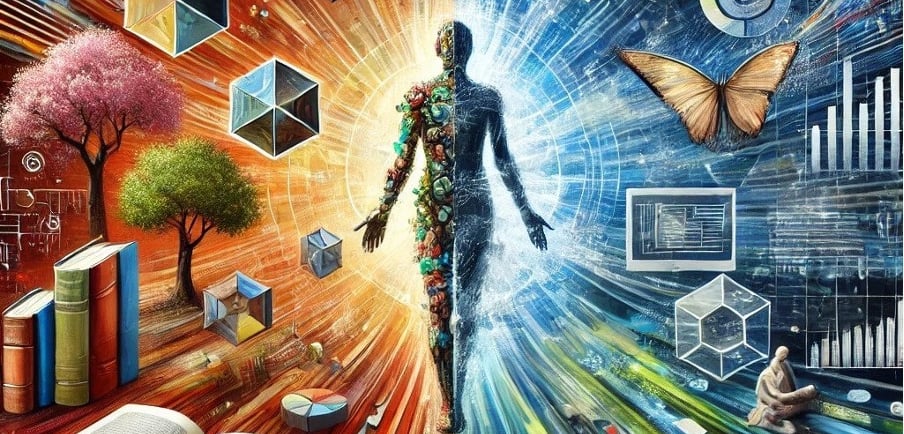Humanism, Dataism and Current Social - A Derived Perspective
Blog post description.
TECHNOLOGY POLICY - INDIA
3/1/20253 min read


Access to the internet allowed the public to be informed about almost anything and everything in the world. Generally, such information access allows people to better understand society and make informed decisions. Technological innovations, including the internet and associated communication media and platforms, helped the public disseminate and consume information at will, facilitating rapid societal, economic and political changes.
However, there is a sceptical side to this technology. While advancing society’s knowledge consumption, it also deepens the existing societal divides. With the increase in content and content generators, the internet creates something called filter bubbles. It is a phenomenon where the public increasingly consumes biased information to validate their selfish arguments. With the increase in filter bubbles, historical myths can become truths just because people tend to accept them as realities after watching corroborated evidence on WhatsApp and other social media.
The BOOM report of 40 national fake news reports by the Indian Media in the year 2020. It appears that national media gather information without proper research or corroboration of facts. This earned it ill fame in the Indian media, and especially the electronic media is criticised for its low standards. Not just in India, this is common worldwide. However, it is unjust to ascribe the filter bubble concept to the internet. Even before the internet, mass media and politics used to go hand in hand. With the internet, the scope and reach of misinformation has increased, facilitating uncontrollable filter bubbles.
The statistics of internet usage and information consumption substantiate the latter argument. The average time spent by an individual Android phone is around 4.9 hours per day in India, as per the report sourced by Times of India. Data consumption per individual is 14 GB per month as per the Financial Express report in 2021. Such usage of the internet allows the public to consume information at will. Today, with the emergence of technologies like AI, recommendation algorithms are increasingly taking over the agency of humans.
The over-dependence on the internet and AI has led to a concerning loss of human agency. Human agency refers to the capacity of individuals to make independent choices and exercise control over their lives. However, the pervasive influence of technology, particularly through the use of AI-driven recommendation algorithms, has the potential to diminish this agency.
The internet and associated communication platforms have enabled the rapid dissemination and consumption of information, which has both positive and negative implications. On the one hand, it allows people to access a wealth of knowledge and make informed decisions. On the other hand, the proliferation of biased information and the creation of "filter bubbles" can lead to the perpetuation of historical myths and the validation of selfish arguments.
Moreover, the growing reliance on AI-driven recommendation systems to curate and present information further exacerbates the loss of human agency. These algorithms, which are designed to optimise for engagement and profitability, can subtly nudge individuals towards certain content and perspectives, ultimately shaping their worldview and decision-making. This undermines the ability of individuals to exercise their independent thinking and judgment, posing a threat to the core principles of humanism.
A conceptual understanding of the above phenomenon can be derived from Harari’s book Nexus. Harari introduces the concept of "dataism" - a belief system that places the flow of data at the center of human existence. In contrast to the latter, humanism argues that the experiences of humans are unique and individually subjective, and thus, one cannot create AI. Dataism corners itself with a functional approach towards human behaviour. It asserts that human experiences are the interactive outcomes of historical data points. If these data points can be tracked, traced and stored, it is easy to predict and control human behaviour. The contrast between humanism and dataism raises critical questions about the role of technology, the nature of human agency, and the future of society.
Technology firms which consider adopting AI can be considered to fall within the spectrum of dataism. For example, consider Robert Downy Jr’s YouTube series on AI. One of the episodes covers the research by Soul Mechanics, which trains the AI to develop on -itself, similar to how a baby grows. It can even feel the emotions! How is this possible? This is because they have induced sample data points to determine the neural network output and are using the data continuously to train and develop the system. Here, the life of a human is considered to be a discrete set of data points, which is the take of datasets.
So, does this mean that humanism would lose its credibility? Where shall we draw the line?
Highlights of the project:
Trace the origin and impact of filter bubbles and the role of AI in shaping human agency and decision-making
Document the existing methods adopted by organisations in India to tackle misinformation.
